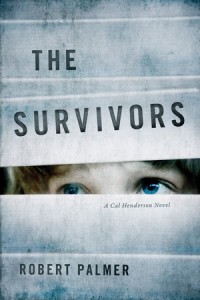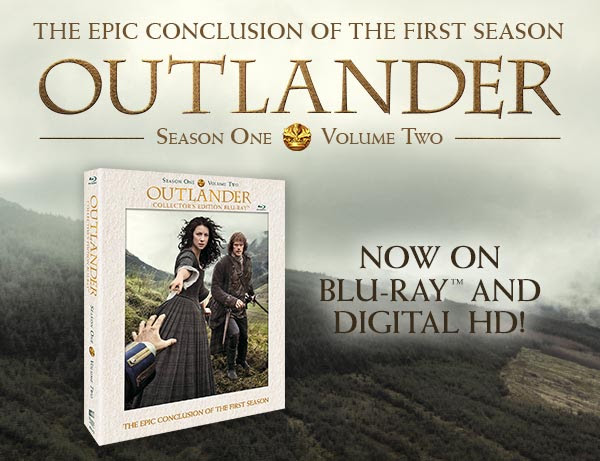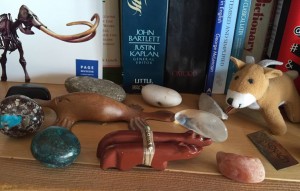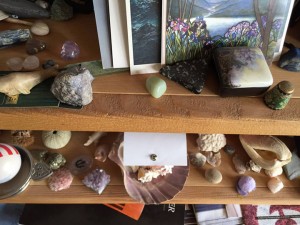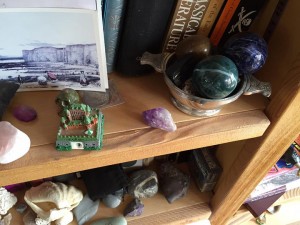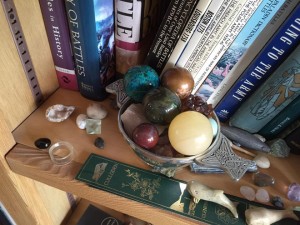 MERRY CHRISTMAS, CHAG SAMEACH, JOYFUL KWANZAA, BLESSED SOLSTICE and/or a DELIGHTFUL EID-AlUdha to all of you!
MERRY CHRISTMAS, CHAG SAMEACH, JOYFUL KWANZAA, BLESSED SOLSTICE and/or a DELIGHTFUL EID-AlUdha to all of you!
[Excerpt from DRUMS OF AUTUMN.]
Jamie’s hair and shoulders were lightly dusted with snow, and flakes were settling on the exposed backs of his legs. I pulled the hem of his cloak down, then brushed the snow away from his face. His cheek was nearly the same color as the big wet flakes, and his flesh felt stiff when I touched it.
Fresh alarm surged through me as I realized that he might be a lot closer to freezing already than I had thought. His eyes were half closed, and cold as it was, he didn’t seem to be shivering much. That was bloody dangerous; with no movement, his muscles were generating no heat, and what warmth he had was leaching slowly from his body. His cloak was already heavy with damp; if I allowed his clothes to become soaked through, he might very well die of hypothermia right in front of me.
"Wake up!" I said, shaking him urgently by the shoulder. He opened his eyes and smiled drowsily at me.
"Move!" I said. "Jamie, you’ve got to move!"
"I can’t," he said calmly. "I told ye that." He shut his eyes again.
I grabbed him by the ear and dug my fingernails into the tender lobe. He grunted and jerked his head away.
"Wake up," I said peremptorily. "Do you hear me? Wake up this moment! Move, damn you! Give me your hand."
I didn’t wait for him to comply, but dug under the cloak and seized his hand, which I chafed madly between my own. He opened his eyes again and frowned at me.
"I’m all right," he said. "But I’m gey tired, aye?"
"Move your arms," I ordered, flinging the hand at him. "Flap them, up and down. Can you move your legs at all?"
He sighed wearily, as though dragging himself out of a sticky bog, and muttered something under his breath in Gaelic, but very slowly he began to move his arms back and forth. With more prodding, he succeeded in flexing his ankles— though any further movement caused instant spasms in his back— and with great reluctance, began to waggle his feet.
He looked rather like a frog trying to fly, but I wasn’t in any mood to laugh. I didn’t know whether he was actually in danger of freezing or not, but I wasn’t taking any chances. By dint of constant exhortation, aided by judicious pokings, I kept him at this exercise until I had got him altogether awake and shivering. In a thoroughly bad temper, too, but I didn’t mind that.
"Keep moving," I advised him. I got up with some difficulty, having grown quite stiff from crouching over him so long. "Move, I say!" I added sharply, as he showed symptoms of flagging. "Stop and I’ll step square on your back, I swear I will!"
I glanced around, a little blearily. The snow was still falling, and it was difficult to see more than a few feet. We needed shelter— more than the rock alone could provide.
"Hemlock," he said between his teeth. I glanced down at him, and he jerked his head toward a clump of trees nearby. "Take the hatchet. Big… branches. Six feet. C-cut four." He was breathing heavily, and there was a tinge of color visible in his face, despite the dim light. He’d stopped moving in spite of my threats, but his teeth were clenched because they were chattering— a sign I rejoiced to see.
I stooped and groped beneath his cloak again, this time searching for the hatchet belted round his waist. I couldn’t resist sliding a hand under him, inside the neck of his fringed woolen hunting shirt. Warm! Thank God, he was still warm. His chest felt superficially chilled from its contact with the wet ground, but it was still warmer than my fingers.
"Right," I said, taking my hand away and standing up with the hatchet. "Hemlock. Six-foot branches, do you mean?"
He nodded, shivering violently, and I set off at once for the trees he indicated.
Inside the silent grove, the fragrance of hemlock and cedar enfolded me at once in a mist of resins and turpenes, the odor cold and sharp, clean and invigorating. Many of the trees were enormous, with the lower branches well above my head, but there were smaller ones scattered here and there. I saw at once the virtues of this particular tree— no snow fell under them; the fanlike boughs caught the falling snow like umbrellas.
I hacked at the lower branches, torn between the need for haste and the very real fear of chopping off a few fingers by accident; my hands were numb and awkward with the cold.
The wood was green and elastic and it took forever to chop through the tough, springy fibers. At last, though, I had four good-sized branches, sporting multiple fans of dense needles. They looked soft and black against the new snow, like big fans of feathers; it was almost a surprise to touch them and feel the hard, cold prick of the needles.
I dragged them back to the rock, and found that Jamie had managed to scoop more leaves together; he was almost invisible, submerged in a huge drift of black and gray against the foot of the rock.
Under his terse direction I leaned the hemlock branches fan-up against the face of the rock, the chopped butt ends stuck into the earth at an angle, so as to form a small triangular refuge underneath. Then I took the hatchet again and chopped small pine and spruce branches, pulled up big clumps of dried grass, and piled it all against and over the hemlock screen. Then at last, panting with exertion, I crawled into the shelter beside him.
I nestled down in the leaves between his body and the rock, wrapped my cloak around both of us, put my arms around his body, and held on hard. Then I found the leisure to shake a bit. Not from cold— not yet— but from a mixture of relief and fear.
He felt me shivering, and reached awkwardly back to pat me in reassurance.
"It will be all right, Sassenach," he said. "With the two of us, it will be all right."
"I know," I said, and put my forehead against his shoulder blade. It was a long time before I stopped shaking, though,
"How long have you been out here?" I asked finally. "On the ground, I mean?"
He started to shrug. Then stopped abruptly, groaning.
"A good time. It was just past noon when I jumped off a wee crop of rock. It wasna more than a few feet high, but when I landed on one foot, my back went click! And next I knew, I was on my face in the dirt, feelin’ as though someone had stabbed me in the spine wi’ a dirk."
It wasn’t warm in our snug, by any means; the damp from the leaves was seeping in and the rock at my back seemed to radiate coldness, like some sort of reverse furnace. Still, it was noticeably less cold than it was outside. I began shivering again, for purely physical reasons.
Jamie felt me, and groped at his throat.
"Can ye get my cloak unfastened, Sassenach? Put it over ye."
It took some maneuvering, and the cost of a few muffled oaths from Jamie as he tried to shift his weight, but I got it loose at last, and spread it over the two of us. I reached down and laid a cautious hand on his back, gently rucking up his shirt to put my hand on cool, bare flesh.
"Tell me where it hurts," I said. I hoped to hell he hadn’t slipped a disc; hideous thoughts of his being permanently crippled raced through my mind, along with pragmatic considerations of how I was to get him off the mountain, even if he wasn’t. Would I have to leave him here, and fetch food up to him daily until he recovered?
"Right there," he said, with a hiss of indran breath. "Aye, that’s it. A wicked stab just there, and if I move, it runs straight down the back o’ my leg, like a red-hot wire."
I felt very carefully, with both hands now, probing and pressing, urging him to try to lift one leg, right, now the other knee… no?
"No," he assured me. "Dinna be worrit, though, Sassenach. It’s the same as before. It gets better."
"Yes, you said it happened before. When was that?"
He stirred briefly and settled pressing back against my palms with a small groan.
"Och! Damn that hurts. At the prison."
"Pain in the same place?"
"Aye."
I could feel a hard knot in the muscle on his right side, just below the kidney, and a bunching in the erector spinae, the long muscles near the spine. From his description of the prior occurrence, I was fairly sure it was only severe muscle spasm. For which the proper prescription was warmth, rest, and anti-inflammatory medication.
Couldn’t get much further away from those conditions, I thought with some grimness.
"I suppose I could try acupuncture," I said, thinking aloud. "I’ve got Mr. Willoughby’s needles in my pouch, and—"
"Sassenach," he said, in measured tones. "I can stand fine bein’ hurt, cold, and hungry. I willna put up wi’ being stabbed in the back by my own wife. Can ye not offer a bit of sympathy and comfort instead?"
I laughed, and slid an arm around him, pressing close against his back. I let my hand slide down and rest in delicate suggestion, well below his navel.
"Er… what sort of comfort did you have in mind?"
He hastily grasped my hand, to prevent further intrusions.
"Not that," he said.
"Might take your mind off the pain." I wiggled my fingers invitingly, and he tightened his grip.
"I daresay," he said dryly. "Well, I’ll tell ye, Sassenach— once we’ve got home, and I’ve a warm bed to lie in and a hot supper in my belling, that notion might have a good bit of appeal. As it is, the thought of— for Christ’s sake, have ye ot the slightest idea how cold your hands are, woman?"
I laid my cheek against his back and laughed. I could feel the quiver of his own mirth, though he couldn’t laugh aloud without hurting his back.
At last we lay silent, listening to the whisper of falling snow. It was dark under the hemlock boughs, but my eyes were adapted enough to be able to see patches of the oddly glowing snow-light through the screen of needles overhead. Tiny flakes came through the open patches; I could see it in some places, as a thin cloud of white mist, and I could feel the cold tingle as it struck my face.
Jamie himself was no more than a humped dark shape in front of me, though as my eyes became accustomed to the murk, I could see the paler stalk where his neck emerged between his shirt and his queued hair. The queue itself lay cool and smooth against my face; by turning my head only a bit, I could brush it with my lips.
"What time do you think it is?" I asked. I had no idea, myself; I had left the house well after dark, and spent what seemed an eternity looking for him on the mountain.
"Late," he said. "It will be a long time before the dawn, though," he added, answering my real question. "It’s just past the solstice, aye? It’s one of the longest nights of the year."
"Oh, lovely." I said, in dismay. I wasn’t warm, by any means—I still couldn’t feel my toes—but I had stopped shivering. A dreadful lethargy was stealing over me, my muscles yielding to fatigue and cold. I had visions of the two of us freezing peacefully together, curled up like hedgehogs in the leaves. They did say it was a comfortable death, but that didn’t make the prospect any more appealing.
Jamie’s breathing was getting slower and deeper.
"Don’t go to sleep!" I said urgently, poking him in the armpit.
"Agh!" He pressed his arm tight to his side, recoiling. "Why not?"
"We mustn’t sleep; we’ll freeze to death."
"No, we won’t," he said crossly. "It’s snowing outside; we’ll be covered over soon."
"I know that," I said, rather cross in my turn. "What’s that got to do with it?"
He tried to turn his head to look at me, but couldn’t, quite.
"Snow’s cold if ye touch it," he explained, striving for patience, "but it keeps the cold out, aye? Like a blanket. It’s a great deal warmer in a house that’s covered wi’ snow than one that’s standing clean in the wind. How d’ye think bears manage? They sleep in the winter, and they dinna freeze."
"They have layers of fat," I protested. "I thought that kept them warm."
"Ha ha," he said, and reaching back with some effort, grabbed me firmly by the bottom. "Well, then, ye needna worry a bit, he?"
With great deliberation I pulled down his collar, stretched my head up, and licked the back of his neck, in a lingering swipe from nape to hairline.
"Aaah!" He shuddered violently, making a sprinkle of snow fall from the branches above us. He let go of my bottom to scrub at the back of his neck.
"That was a terrible thing to do!" he said, reproachful. "And me lyin’ here helpless as a log!"
"Bah, humbug," I said. I nestled closer, feeling somewhat reassured. "You’re sure we aren’t going to freeze to death, then?"
"No," he said. "But I shouldna think it likely."
"Hm," I said, feeling somewhat less reassured. "Well, perhaps we’d better stay awake for a bit, then, just in case?"
"I wilna wave my arms about anymore," he said definitely. "There’s no room. And if ye stick your icy wee paws in my breeks, I swear I’ll throttle ye, bad back or no."
"All right, all right," I said. "What if I tell you a story, instead?"
Highlanders loved stories, and Jamie was no exception.
"Oh, aye," he said, sounding much happier. "What sort of story is it?"
"A Christmas story," I said, settling myself along the curve of his body. "About a miser named Ebenezer Scrooge."
"An Englishman, I daresay."
"Yes," I said. "Be quiet and listen."
I could see my own breath as I talked, white in the dim, cold air. The snow was falling heavily outside out shelter; when I paused in the story, I could hear the whisper of flakes against the hemlock branches, and the far-off whine of wind in the trees.
I knew the story very well; it had been part of our Christmas ritual, Frank’s and Brianna’s and mine. From the time Bree was five or six, we had read A Christmas Carol every year, starting a week or two before Christmas, Frank and I taking it in turns to read to her each night before bed.
"And the specter said, ‘I am the Ghost of Christmas Past…’"
I might not be freezing to death, but the cold had a strange hypnotic effect nonetheless. I had gone past the phase of acute discomfort and felt now slightly disembodied. I knew my hands and feet were icy, and my body chilled half through, but it didn’t seem to matter anymore. I floated in a peaceful white mist, seeing the words swirl round my head like snowflakes as I spoke them.
"…and there was dear old Fezziwig, among the lights and music…"
I couldn’t tell whether I was gradually thawing or becoming colder. I was conscious of an overall feeling of relaxation, and an altogether peculiar sense of déjà vu, as though I had once before been entombed, insulated in snow, snug despite desolation outside.
As Bob Cratchit bought his meager bird, I remembered. I went on talking automatically, the flow of the story coming from somewhere well below the level of consciousness, but my memory was in the front seat of a stalled 1956 Oldsmobile, its windscreen caked with snow.
We had been on our way to visit an elderly relative of Frank’s, somewhere in upstate New York. The snow came on hard, halfway there, howling down across the icy roads with gusts of wind. Before we knew where we were, we had skidded off the road and halfway into a ditch, the windscreen wipers slashing futilely at the pelting snow.
There was nothing to be done but wait for morning, and rescue. We had had a picnic hamper and some old blankets; we brought Brianna up into the front seat between us, and huddled all together under coats and blankets, sipping lukewarm cocoa from the thermos and making jokes to keep her from being frightened.
As it grew later, and colder, we huddled closer, and to distract Brianna, Frank began to tell her Dickens’s story from memory, counting on me to supply the missing bits. Neither of us could have done it alone, but between us, we managed well. By the time the sinister Ghost of Christmas Yet to Come had made his appearance, Brianna was snuggled sound asleep under the coats, a warm, boneless weight against my side.
There was no need to finish the story, but we did, talking to each other below the words, hands touching below the layers of blankets. I remembered Frank’s hands, warm and strong on mine, thumb stroking my palm, outlining my fingers. Frank had always loved my hands.
The car had filled with the mist of our breathing, and drops of water ran down inside the white-choked windows. Frank’s head had been a dark cameo, dim against the white. He had leaned toward me at the last, nose and cheeks chilled, lips warm on mine as he whispered the last words of the story.
"’God bless us, every one,’" I ended, and lay silent, a small needle of grief like an ice splinter through my heart. It was quiet inside the shelter, and seemed darker; snow had covered over all the openings.
Jamie reached back and touched my leg.
"Put your hands inside my shirt, Sassenach," he said softly. I slid one hand up under his shirt in front, to rest against his chest, the other up his back. The faded whip marks felt like threads under his skin.
He laid his hand against mine, pressing it tight against his chest. He was very warm, and his heart beat slow and strong under my fingers.
"Sleep, a nighean donn,"" he said. "I wilna let ye freeze."
Click here to read excerpts (aka "Daily Lines") from Book Nine, the new book I am working on in the OUTLANDER series.
Also posted on my Facebook Page on Friday, December 25, 2015. The image is of my family Christmas tree for this year.
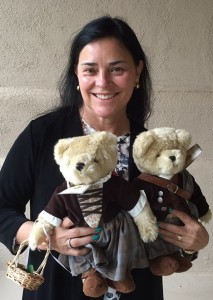
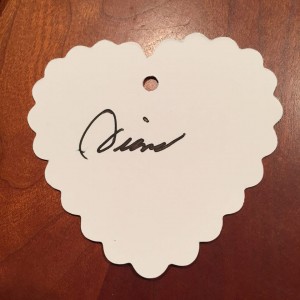
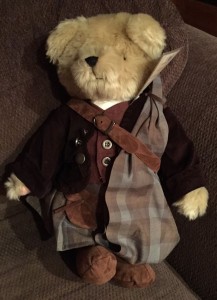
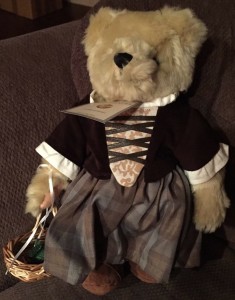
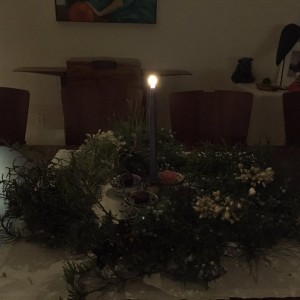 Advent is a time of waiting, and of preparation. Of contemplation—of what is past, and what is to come. During Advent, we make wreaths, made of leaves or evergreens, with four candles, and we light one candle for each of the four Sundays leading up to Christmas.
Advent is a time of waiting, and of preparation. Of contemplation—of what is past, and what is to come. During Advent, we make wreaths, made of leaves or evergreens, with four candles, and we light one candle for each of the four Sundays leading up to Christmas.